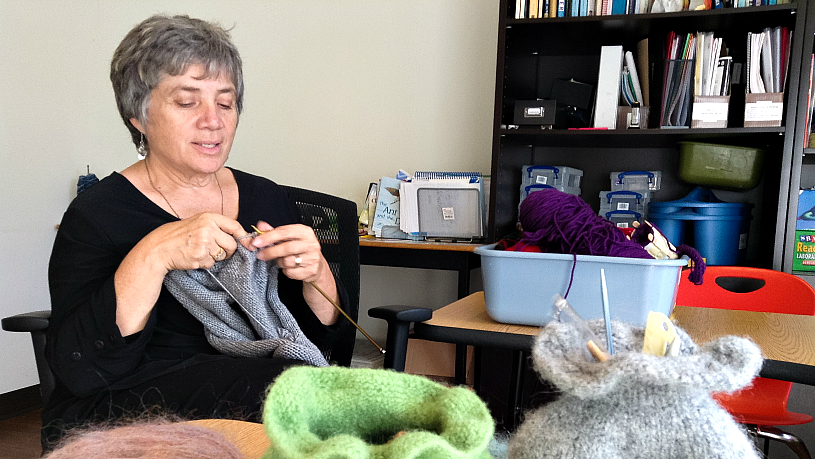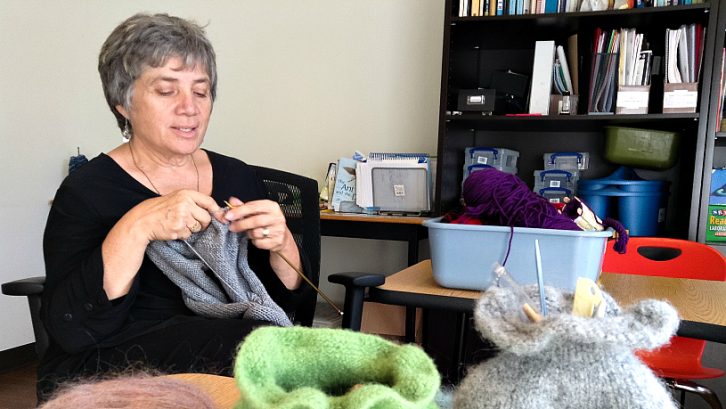Life
Striving to help the homeless who have mental illness
‘A stepping stone to more independent living'

caption
Linden Gray, founder of Caldy Grange knitting for the Philanthropic Knitters Guild - a project to end homelessness.
caption
Linden Gray, founder of Caldy Grange, knitting for the Philanthropic Knitters Guild, a recent project she has also founded.Linden Gray is reaching out to help those with severe mental illness who are living on the streets, through a housing system in Halifax.
Caldy Grange Supported Housing is a non-profit organization inspired by L’Abri en Ville, a housing model in Montréal. Caldy Grange provides supported housing to young adults who are either struggling with or recovering from a severe mental illness, like schizophrenia.
“Our society is comfortable with having people who are clearly unable to help themselves scrape by in an unsafe way on our street corners,” says Gray. “I just think it’s outrageous that we have been acclimatized by it.”
“We walk by them and think, should I give them change, or shouldn’t I, and I think that’s really wrong.”
Gray has had a longstanding interest in social justice and issues surrounding homelessness, and began researching the subject in 2012. She opened the first Caldy Grange apartment in October 2014.
Ian Burton has been a resident with Caldy Grange for almost two years.
“Caldy Grange took me in during a difficult time in my life when I had been homeless for quite a while,” he says. “I am thankful every day that I am where I am.”
Caldy Grange has three apartments in Halifax. There is one in the Oxford-Quinpool area, one on Carleton Street and one near the Armdale Rotary.

caption
The Caldy Grange logo.“Caldy has given me ample support for moving forward at this time of my life, and the program supports a healthy environment to share with others,” says Burton.
For those suffering or those who are overcoming a mental illness, everyday tasks can be a challenge.
“We help them find a sympathetic, understanding landlord and a normal apartment, (something) that you or I would be happy to live in,” says Gray.
The individuals living in the units are either working or are on social assistance, and pay for rent, utilities, food and other amenities.
“We’re not there to take over their finances and provide it,” says Gray. “We are there to help them find in-community solutions to the skill-building and confidence-building that they need.”
Todd MacMillan, one of Caldy Grange’s eight board members, says the initiative “gives folks with mental health issues a chance to participate more fully in the community.”
Caldy also serves as a stepping stone to more independent living, where residents will acquire skills and confidence, says MacMillan, who also works with the Schizophrenia Society of Nova Scotia.
MacMillan emphasizes that Caldy is set apart from other housing organizations in Nova Scotia because it is managed by volunteers and places more emphasis on skill development, independence and community integration.
The organization is seeking charitable status from the federal government. It has received grants from the Mental Health Foundation and the Nova Scotia government, but Gray says the organization has come up with a new way to help fund its operations.
In early October, Gray combined her love of knitting and social justice to create the Philanthropic Knitters Guild, a project to end homelessness.The knitting group plans to meet monthly.
Gray’s vision is to make high-quality knitted home décor items from natural fibers, such as bamboo or linen, to sell at the Halifax Seaport Farmers’ Market. All proceeds will go to Caldy Grange.

